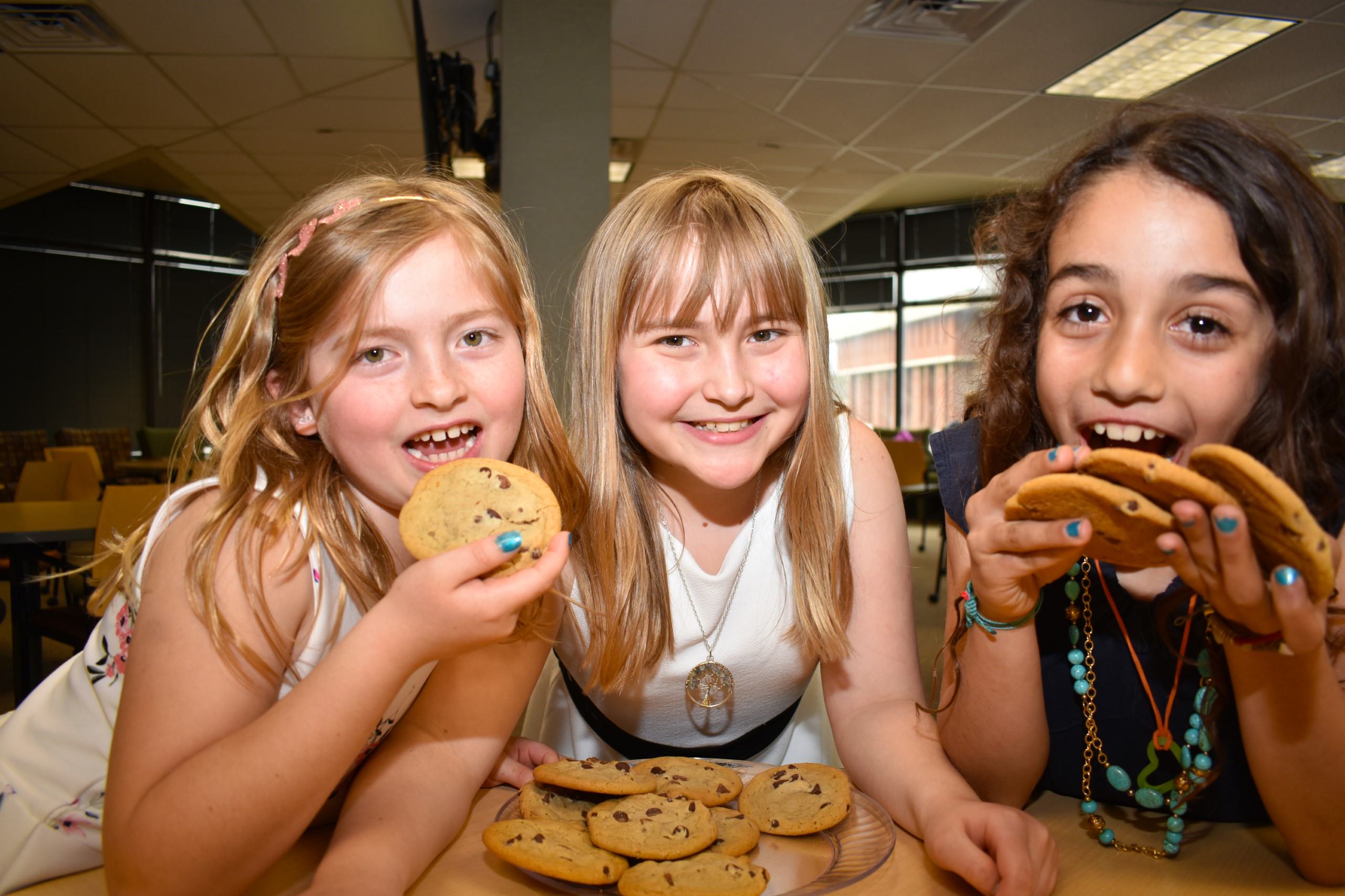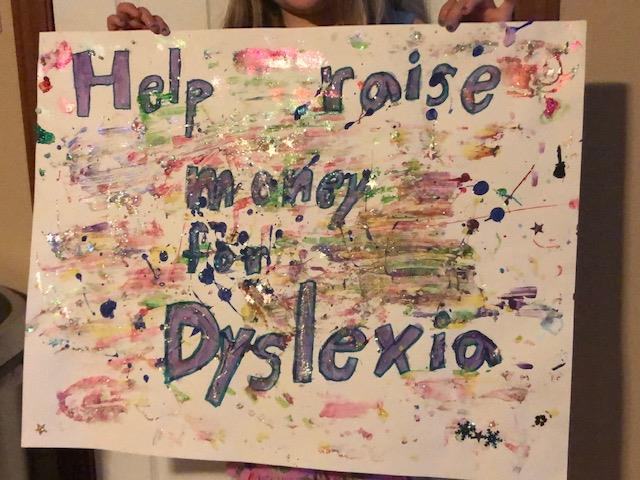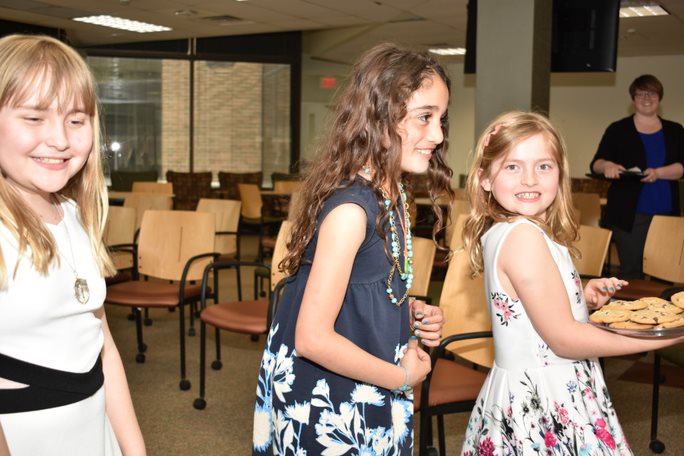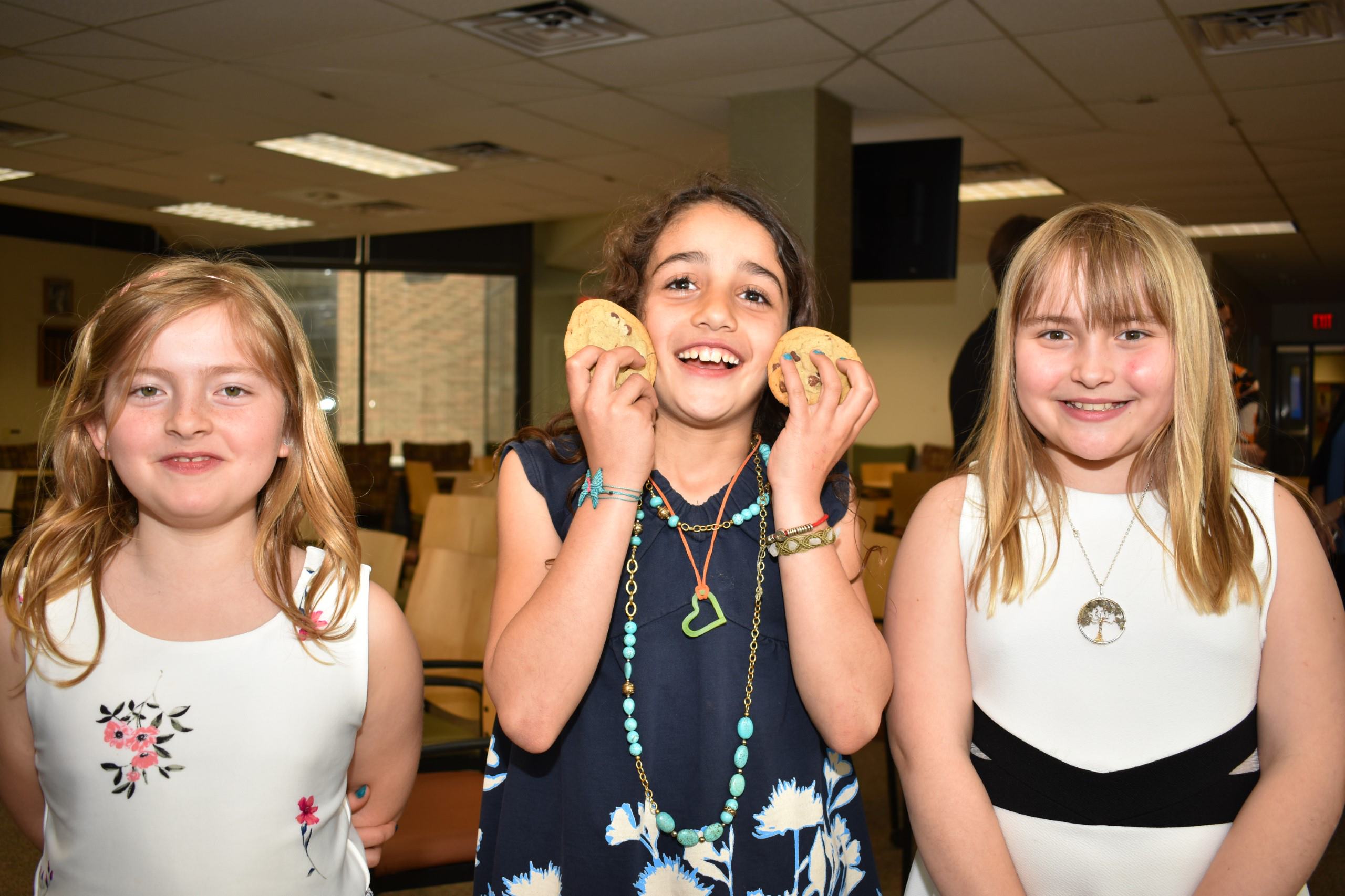
May 23, 2019
By Kate Alexander, Student Assistant, Iowa Reading Research Center
Imagine looking out your living room window in late winter and seeing three elementary-aged girls pulling a sled down your street. Rather than pulling each other on the sled, they are pulling a multitude of homemade chocolate chip cookies. As they go door-to-door in the winter chill attempting to sell their warm, freshly baked dessert, you may assume they are raising money for a school cause or a popular organization. However, the girls are raising money for dyslexia, a cause that is close to their hearts.
Growing up, sisters Grace, 10, and Sophie Vignato, 8, and their friend nine-year-old Talen Shibli-Rahhal had seen various fundraisers for numerous causes. But they had never seen fundraising efforts for dyslexia, a reading disability that Grace, Sophie, and 5-8% of students have, according to evidence from research on dyslexia.
Disappointed with the lack of awareness regarding dyslexia, the girls decided they would take the initiative and spread awareness throughout their Iowa City neighborhood by baking.
Before embarking on their neighborhood adventure in mid-March this year, the girls all agreed that any money they raised would be donated to dyslexia research.
“Dyslexia research is important because it helps people like Grace and I,” Sophie said. “While everyone might not be able to physically see the research being done, it touches lives and makes a difference.”
“I do not have dyslexia,” Talen said, “but I know dyslexia affects Grace and Sophie. And dyslexia research means a lot to them, so I wanted to help.”
The three girls chose to donate to the Iowa Reading Research Center because of the Vignato’s prior exposure to the center and admiration for its efforts with dyslexia research.
“We knew from personal experience the Iowa Reading Research Center was a great place to support,” said Julie Vignato, Grace and Sophie’s mom. “When we moved to the area, we met with [IRRC Director] Dr. Deborah Reed to help us find resources to help Grace with her dyslexia. We are so very appreciative of Dr. Reed and the IRRC for their research and efforts.”
The Cookie-Baking Trio That Helps Others with Dyslexia
The Iowa Reading Research Center welcomed the girls and their moms, Julie and Amal Shibli-Rahhal, to the center for a ceremony, complete with a spread of the chocolate chip confection that the girls had put to such good use for their fundraiser.
Each girl went around the room and introduced herself to the assembled IRRC staff with big smiles and firm handshakes. Their maturity and persuasive knowledge of dyslexia were very impressive. It was obvious why their bake sale was a success.
Grace and Talen used Grace’s kitchen to bake. Grace and Sophie’s mom, Julie, had control of the oven, and the family dog helped clean up the mess of ingredients that periodically fell to the floor. Together, the girls made several batches of chocolate chip cookies to sell.
While Grace and Talen were busy baking in the kitchen, Sophie utilized her outgoing personality and savvy social skills to develop a strategy to best approach their potential customers.
“I don’t think enough people know about dyslexia or think that it is a big deal and can really affect people’s lives,” Sophie said.
Her older sister Grace added, “There is money always being raised for different causes like cancer, but never for dyslexia. We want people to be aware that dyslexia exists.”
As they traveled door-to-door accompanied by a hand-painted sign with multicolored streaks and purple lettering reading “Help raise money for dyslexia,” they took the opportunity to inform their potential customers about dyslexia.
“While we were selling, there were people that would see our sign, but wouldn’t ask why we were selling,” Grace said. “This was upsetting because it made us feel like they didn’t care because it isn’t something that personally affects them. But there were also some people that were interested and chose to donate without buying a cookie.”
The girls’ goals were not to exceed a certain amount of money. Rather, they wanted to bring awareness of dyslexia to as many people as they could.
“It was okay if people didn’t actually listen to what we had to say,” Sophie said, “but as long as they could hear us say ‘dyslexia,’ that was enough for us. Because maybe then they will remember us saying ‘dyslexia’ and look it up or make a conversation with a neighbor about it. Just as long as people start to become more familiar.”



The Impact of Their Efforts
The cookies were a hit, mostly due to Grace and Talen’s talent for baking, and Sophie’s zealous selling skills. After only a day of selling, the girls raised $64.
Julie and Amal become emotional when talking about what their daughters did, but were not completely surprised that they would have the motivation to do such a wonderful and gracious thing of their own volition.
“When the girls said they wanted to donate their money to dyslexia research, I was so touched and proud,” Julie said. “They both care so much about other people, and I was proud of them for wanting to advocate not just for themselves, but for all people that have dyslexia.”
“Talen has such a big heart, and I wanted to help her support Grace and Sophie,” Amal said. “She loves her friends, and she always wants to help them in any way that she can. She is that type of kid, and I’m so proud of her.”
Reed expressed her gratitude on behalf of the IRRC for the girls’ gracious donation. “As a research center, we are touched by Grace, Sophie, and Talen’s donation to dyslexia research and appreciate that the girls want to bring awareness to dyslexia. This is something that we, as a center, are trying to do, but it is a powerful message that elementary-aged girls are willing to devote themselves to this effort. We are also thankful to Julie and Amal for raising such kind-hearted and generous girls.”
Recently, the Iowa Reading Research Center released a new eLearning Dyslexia Overview module, a free resource for any resident of Iowa to use. The Vignato family is aware of the work for those with dyslexia that is being done and hope the money they donated will contribute to the IRRC’s ongoing efforts.
“As a mom, you want to do the best for your children,” Julie said. “I want to educate myself as best as possible so I can advocate for them. That’s why I appreciate the work that the Iowa Reading Research Center does for learning disabilities, especially dyslexia.”
Back at the ceremony, the girls bravely spoke in front of the crowd of IRRC staff members about why dyslexia research is important and valuable to the dyslexia community.
“If future generations can become more aware and educated about dyslexia, then maybe more people will know that it’s okay to have dyslexia,” Sophie said, standing behind a podium that her head barely cleared.
“People who do struggle might learn that they aren’t alone and it’s okay to admit that you have dyslexia. The more research that is done, the more people will learn that dyslexia is nothing to be ashamed of.”